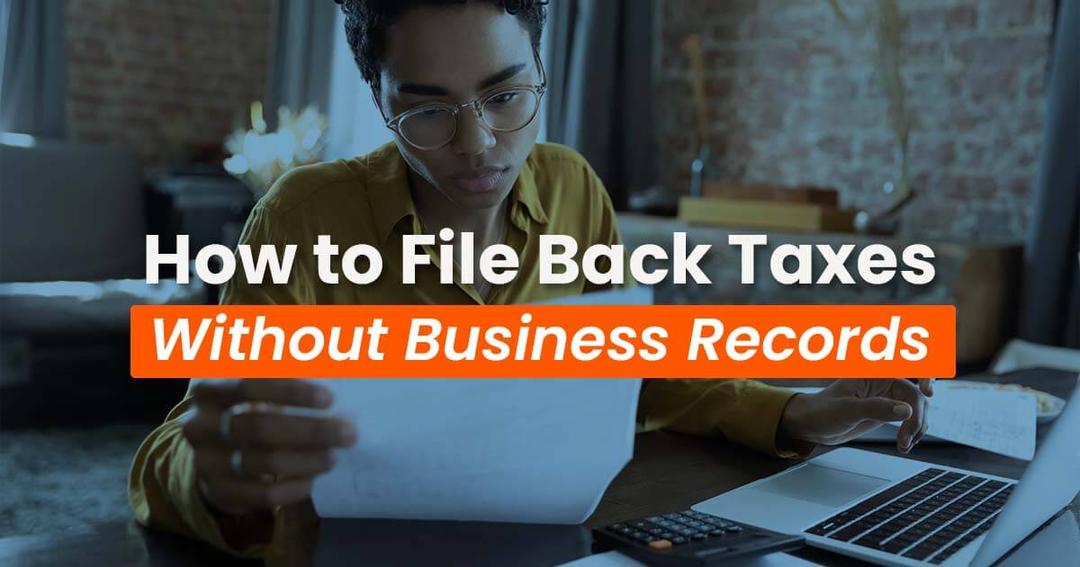
Filing business taxes is an essential responsibility as a small business owner, but it can be complicated, especially if you're not prepared. One thing leads to another, and you can fall further and further behind.
The good news is it's not too late to file a return for back taxes in 2026, even if you're past the due date for your tax return. The more significant challenge lies in filing back taxes without records.
Preparing your tax return will be difficult if you don't have a complete accounting of your finances. How can you pay what you owe if you don't know all of the income you've received? Fortunately, you have options. Use this blog to learn how to file back taxes without records in 2026.
Why You Should File Back Taxes for Your Small Business
There are several reasons to file your income tax returns, even if you are far beyond the deadline. Even late, it’s worth the effort to avoid what happens if you don’t file business taxes.
If you don't file a return, the IRS will eventually file a substitute return based on its data to estimate what you owe. It isn't likely that the IRS will include every benefit and deduction you're eligible for, which would have reduced your tax liability. You will also surrender any possible tax refunds if you don’t file a return.
There is also a failure to file penalty that you'll be responsible for paying. If you have unpaid taxes, that amount will grow each month you continue without filing a late return, for up to 5 months afterward.
You should make every effort to catch up on unfiled taxes to claim your deductions and receive your refund. Filing your small business taxes also helps ensure you've paid everything you owe, no matter how late you file. Unpaid taxes will rack up significant fines over time, and the IRS will eventually act to collect them on its own if you don't pay.
How Many Years Back Can You File Delinquent Taxes?
The IRS will accept past-due tax returns. However, if you want to claim a tax refund or credit, you must file your return within three years of the original deadline. Filing past-due tax returns aren't worth the effort if you go further back than that.
You should file past taxes for at least the last three years to claim any benefits you left behind, ideally up to the previous six years. How many years you can file back taxes will typically depend on the data you still have from those years.
How To File Back Taxes Without Records
You don't want to file alone, especially when you're missing significant records. You can file back taxes just like any other IRS Form 1040, U.S. Individual Income Tax Return.
The IRS will accept your past-due federal tax returns as soon as you submit them. For state tax issues, you should look up your individual state's policies or speak to an accounting professional.
If you don't have a good record of your finances over the period in question, however, it will be more challenging to figure out your tax bill. Here’s how to get started:
Collect Financial Records
To file your return, the first thing you need to do to get started is to collect all the financial data you can find on the tax years in question. You may not have consistent or reliable bookkeeping, but there must be some clues or records you can refer to that will help you assess your tax liability.
These are some of the most common sources you might be able to use to put together your past-due tax return:
Bank account and credit card statements
Tax forms like W-2s and Social Security statements
Receipts from business expenses
Emails or paper records of transactions
Requesting Tax Transcripts
You might not find enough information to go into your records alone. Fortunately, the IRS also holds various documents and forms for at least three years. You can request IRS tax transcripts with IRS Form 4506-T to get your tax record.
There are a few distinct kinds of tax transcripts you may be able to request:
Transcripts of tax returns you submitted in a prior year
A report on your basic filing status and taxable income according to IRS records
A wage and income transcript brings together 1099s, W-2s, and any other relevant paperwork the IRS has received from other businesses or financial institutions.
Work with Forensic Accounting Experts
If you’re struggling and still don’t know how to file back taxes without W-2s or other records, you may need to contract with a tax professional or a team with specialties in forensic accounting. Forensic accounting specializes in investigating and reconstructing business activity without regular records.
You want to be sure you get your tax return prepared correctly, so you want to work with professionals who know how to put the data together, maximize your savings, and get it done right to help defend you from a potential audit.
How 1-800Accountant Can Help With Your Delinquent Business Taxes in 2026
If you’re trying to file back taxes without records, you may need tax preparation help from the experts. When you trust 1-800Accountant, America's leading virtual accounting firm, our accountants can help file back taxes for your company and get you back on track with your bookkeeping obligations, ensuring smooth operations in the future.
This post is to be used for informational purposes only and does not constitute legal, business, or tax advice. Each person should consult his or her own attorney, business advisor, or tax advisor with respect to matters referenced in this post. 1-800Accountant assumes no liability for actions taken in reliance upon the information contained herein.
